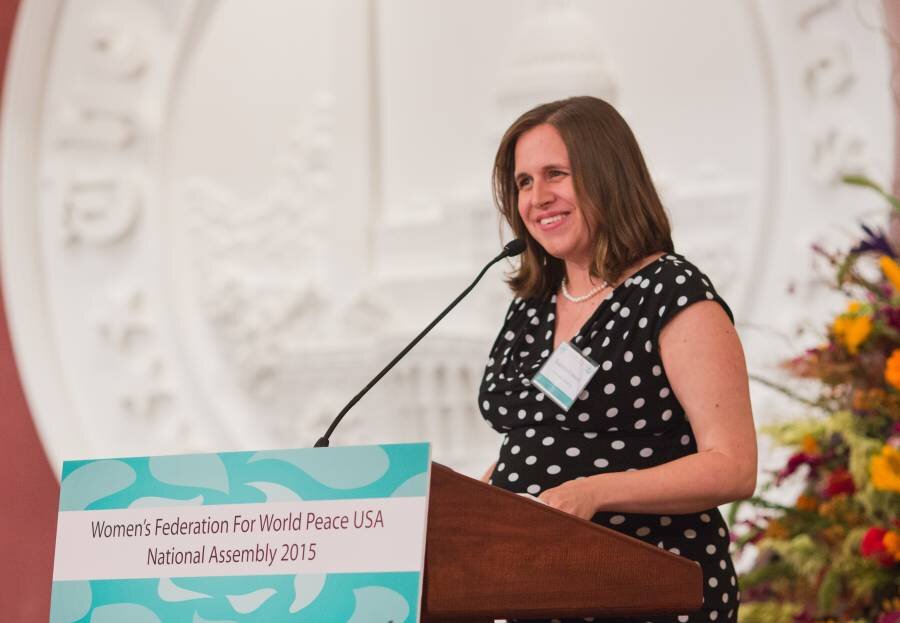TWO HALVES OF A WHOLE: WHAT I LIKE ABOUT WFWP
Mrs. Katarina Connery, WFWP USA Vice President
Good Evening Ladies and Gentlemen,
I would like to share with you this evening a little bit about why I am proud to be part of WFWP.
I studied International Development for my master’s degree. In the field of international development “gender equality,” “women’s rights,” and “empowerment” are buzzwords which are extremely popular these days. United Nations agencies, governments, and hundreds of nonprofit organizations are concerned with how to uplift the status of women, especially in countries or sectors of society where women’s voices have been historically absent.
In fact, the global concern for gender equality is at the level that many development funding agencies, such as the World Bank and USAID, actually require that projects and programs have a component of gender empowerment. However, as I studied about all the various efforts to empower women, I felt that something was lacking.
As just one example: there seems to be a tendency to measure women’s equal status in society in terms that are relative to men; such as how much less money women make relative to men in similar positions; how many women work outside the home compared to their husbands, sons, or brothers; or how many women are in positions of government versus men.
It is as if, to be considered by society as a person of equal value, I, a woman, should have the same things that men have; and I should want the same things that men want. Then, to take it a step further, I am expected to compete with men to attain those things. I have to take back something that was stolen from me by men. Then, some take it even further with an antagonistic view of men: men are the reason there are so many things wrong with the world.
Certainly, historically speaking, men have dominated decision-making while women’s voices have not been taken as seriously. The world we live in is a result of that. That includes the good things as well as the many, many saddening and disturbing realities about our world today—poverty, hunger, war, abuse, greed.
However, imagine if you will, if the roles had been reversed -- if women were the ones with the power, if, rather than a male-dominated history, we had a female-dominated history. Would we have world peace? I believe we would not. The world would certainly be different, but it would not be at peace.
Women have a unique role to play toward building peace. We have unique leadership qualities, styles, and perspectives which have been seriously lacking in the world, qualities men do not have. However, men also have unique leadership qualities, styles and perspectives women do not have and the world still needs those as well. Therefore, it is not about saying, “Step aside, men, it’s our turn to be on top now.”
WFWP recognizes that in order to build world peace, rather than women taking the reins from men, it is time for men and women to start driving together. I would like to read a quote from WFWP Founder, Dr. Hak Ja Han Moon on the occasion of the 20th Anniversary of WFWP:
“We women were not put on earth merely to help or to be protected by men. We are independent individuals who, as representatives of the feminine aspect of God's nature, are meant to help men become more complete. Through true love, women are to be men's precious partners in love. Men and women are absolutely equal in terms of value.
“Men and women do not need to struggle with each other, because they do not need to imitate the characteristics, dispositions or roles of the other. It is not necessary to confront, compete, or covet the things of the other, or take them by force. Instead, by giving what one has to the other, with true love, and by completing the other, they can become united as a greater whole and share in a relationship of joint ownership.
“Now women and men should play a major role in world history, by serving alongside each other like the wheels of a great engine pulling the construction of a peaceful world forward.”
This is one major thing that inspires me about WFWP’s vision for peace. We seek to empower all women—all daughters, sisters, mothers, and wives—to use their unique creativity in conjunction with the unique creativity of our sons, brothers, fathers, and husbands to build a more peaceful and harmonious world. Peace is not sustainable unless we all work together, as two halves of one whole.

